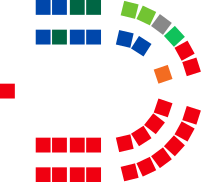Parliament of Western Australia | |
|---|---|
| 41st Parliament | |
 | |
 Parliament of Western Australia logo | |
| Type | |
| Type | |
| Houses | Legislative Council Legislative Assembly |
| Sovereign | King (represented by the governor of Western Australia) |
| History | |
| Founded | 30 December 1890 |
| Leadership | |
Charles III since 8 September 2022 | |
Chris Dawson since 15 July 2022 | |
| Structure | |
| Seats | 95 59 MLAs 36 MLCs |
 | |
Legislative Assembly political groups | Government (53) Labor (53) |
 | |
Legislative Council political groups | Government (21) Labor (21) |
| Elections | |
| Instant-runoff voting | |
| Single transferable vote | |
Last Legislative Assembly election | 13 March 2021 |
Last general election | 13 March 2021 |
Next general election | 8 March 2025 |
| Meeting place | |
 | |
| Parliament House, Perth, Western Australia, Australia | |
| Website | |
| www | |
The Parliament of Western Australia is the bicameral legislature of the Australian state of Western Australia, which constitutes the legislative branch of the state's political system. The parliament consists of the King (represented by the governor), the Legislative Council (the upper house) and the Legislative Assembly (the lower house).[1] The two Houses of Parliament sit in Parliament House in the state capital, Perth.
For a bill to become law, it must be passed by both the Legislative Council and the Legislative Assembly, and receive royal assent from the Governor.
The party or coalition commanding the support of a majority of the members of the Legislative Assembly is invited by the governor to form government. The head of government holds the office of Premier of Western Australia.[2]
Currently, the Legislative Council has 36 members elected for four-year terms from multi-member constituencies by proportional representation, and the Legislative Assembly has 59 members, elected for four-year terms from single-member constituencies, using preferential voting. As with all other Australian states and territories, enrolment to vote and voting for both Houses is compulsory for all resident Australian citizens—and eligible British citizens (i.e., those permanently resident and on the electoral roll prior to the passage of the Australia Act)—who are over the legal voting age of 18.
Cite error: There are <ref group=lower-alpha> tags or {{efn}} templates on this page, but the references will not show without a {{reflist|group=lower-alpha}} template or {{notelist}} template (see the help page).
- ^ Constitution Act 1889 (WA) s 2
- ^ "Legislative Assembly" (PDF). About Parliament. Parliament of Western Australia. p. 7.1. Archived from the original (PDF) on 7 March 2016. Retrieved 20 December 2014.